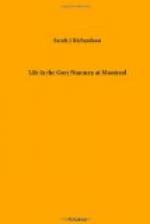For the honor of humanity we could hope that this opinion was correct; but facts of recent date compel us to believe that it is as false as it is ruinous to the best interests of our country and the souls of men. A few of these facts, gathered from unquestionable sources, and some of them related by the actors and sufferers themselves, we place before the reader.
In November, 1854, Ubaldus Borzinski, a monk of the Brothers of Mercy, addressed an earnest petition to the Pope, setting forth the shocking immoralities practised in the convents of his order in Bohemia. He specifies nearly forty crimes, mostly perpetrated by priors and subpriors, giving time, place, and other particulars, entreating the Pope to interpose his power, and correct those horrible abuses.
For sending this petition, he was thrown into a madhouse of the Brothers of Mercy, at Prague, where he still languishes in dreary confinement, though the only mark of insanity he ever showed was in imagining that the Pope would interfere with the pleasures of the monks.
This Ubaldus has a brother, like minded with himself, also a member of the same misnamed order of monks, who has recently effected his escape from durance vile.
John Evangelist Borzinski was a physician in the convent of the Brothers of Mercy at Prague. He is a scientific and cultivated man. By the study of the Psalms and Lessons from the New Testament, which make up a considerable part of the Breviary used in cloisters, he was first led into Protestant views. He had been for seventeen years resident in different cloisters of his order, as sick-nurse, alms gatherer, student, and physician, and knew the conventual life out and out. As he testifies: “There was little of the fear of God, so far as I could see, little of true piety; but abundance of hypocrisy, eye-service, deception, abuse of the poor sick people in the hospitals, such love and hatred as are common among the children of this world, and the most shocking vices of every kind.”
He now felt disgust for the cloister life, and for the Romish religion, and he sought, by the aid of divine grace, to attain to the new birth through the Word of God. Speaking of his change of views to a Prussian clergyman, he thus describes his conversion: “Look you, it was thus I became a Protestant. I found a treasure in that dustheap, and went away with it.” This treasure he prized more and more. He then thought within himself, if these detached passages can give such light, what an illumination he must receive if he could read and understand the whole Bible.




